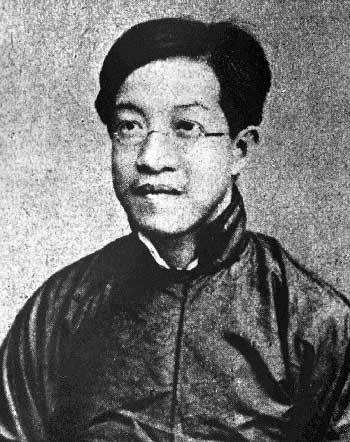Views
Zhāng Tàiyán 章太炎 (1868-1936)
|
|
Names 名: Xuéchéng 學乘, Bǐnglín 炳麟 Courtesy names 字: Méishū 枚叔, Tàiyán 太炎 |
| Notable Associates: |
|
Zhāng Tàiyán 章太炎 (1868-1936)
Short bio.
- Style name 號:
- Dharma name 法名:
Biography
Zhāng was the scion of a wealthy literati family from Zhèjiāng. He received a classical education. In his twenties, Zhāng became involved in the reform movement led by Kāng Yǒuwéi 康有為, but his position became more radical than Kāng’s and he eventually called for the overthrow the Manchu government. This shift in his thought was connected to his embrace of social Darwinism, which was associated with criticism of the ethnic minority Manchu government’s control over China’s majority Han ethnicity. At this point in his life, Zhāng also adopted a materialist position, which was based heavily on the thought of the 3rd century B.C.E. Chinese thinker Xúnzi 荀子. He was also highly critical of both the Christian idea of god and Buddhist reincarnation, which he describes as the belief in a transmigrating soul.
In the first decade of the 20th century, Zhāng was imprisoned by the government for his radical views. While in prison he began to study Buddhism, particularly Consciousness-Only thought and classical Buddhist logic. Although he studied Buddhism a little bit before this period, this marks his conversion to Buddhism and afterward he became known primarily as a Buddhist scholar. Zhāng eventually rejected materialism (and the evolutionistic ideal of progress) in favor of a worldview based on Consciousness-Only. By 1918, he had left the world of politics behind to focus completely on Buddhist scholarship.
Important Works
Notable Students
Notes
References:
- Chan, Sin-wai. Buddhism in Late Ch’ing Political Thought. Hong Kong: The Chinese University Press, 1985. Pp. 43-46.
- Chang, Hao. Chinese Intellectuals in Crisis: Search for Order and Meaning, 1890-1911. Berkeley: University of California Press, 1897. Pp. 104-145.
- Laitinen, Kauko. Chinese Nationalism in the Late Qing Dynasty: Zhang Binglin as an Anti-Manchu Propagandist. London: Curzon, 1990.
- Táng Zhìjūn 湯志鈞. Zhāng Tàiyán zhuàn 章太炎傳 (Biography of Zhang Taiyan). Taipei: Taiwan Commercial Press, 1996.
- Yú Língbō 于凌波, ed. Xiàndài Fójiào rénwù cídiǎn 現代佛教人物辭典 (A Dictionary of Modern Buddhist Persons), 2 vols. Taipei: Foguang, 2004. Pp. 1.1112a-1115a.
